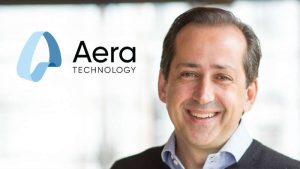Frederic Laluyaux is the President and CEO of Aera Technology. He joined the company in January 2017 after leading Anaplan Inc as CEO. He has also held senior management positions at SAP.
In the early 1990’s he founded Transcribe Technologies. In some ways his career has now come full circle working at another start-up. Born in France he now lives in the US. He has some interesting insights on leadership and shares his vision for Area Technology. A company that is layering predictive and prescriptive analytics onto ERP data.
ET: Who is your inspiration and why?
Frederic Laluyaux: I don’t have a single individual that I can relate to. It’s more like, people who take risks to realise their vision and their dreams, be it artistic, spiritual, athletic, business. I’m inspired by people who will live their life fully and are willing to take risks for it.
ET: How would you describe your leadership style?
Frederic Laluyaux: Direct and open. I sit in the middle of the floor. I say I don’t have an open door policy because I simply don’t have a door. Try to be as genuine as possible and use a sense of humour in leadership as well. When I’m faced with a problem, I’ll be aggressive in the way I tackle the problem, or I’ll be passive in the way I decide not to get involved. The one thing I don’t like is people or situations where I’m forced to be passive-aggressive. I’m either in or out. That’s really the way I think about my leadership style, what I’m trying to be.
ET: What was your darkest business day and how did you overcome it?
Frederic Laluyaux: I would go back almost 20 years ago, when I had to shut down my second start-up. I was 27 years old and it was in Paris. We got really close to being quite successful with that company, but this thing called the internet came around and basically wiped us out. We had an EDI technology software, and the internet just replaced it. That was dark because at the time in Paris, the word “start-up” did not exist. The word “entrepreneur” was not really known. It’s a French word but everybody at the business school goes and works for a big company. I just felt like I’d failed, and that was a very hard feeling.
How did I overcome it? I remember sitting down with my dad at the time. He actually wrote me a letter that I still have. It’s probably the only letter he actually wrote to me specifically. He highlighted all the things that I’d done, how that was pretty cool and how I should feel proud about what I did. Despite the fact that the outcome was a company that I had to shut down, I always kept that, and just looked at it and looked at the bright side of things. That letter just gave me the kick in the butt that I needed to re-engage and restart something. But I remember feeling pretty down at that time.
I’m just so proud of that situation because it really was not his style. He didn’t do that kind of thing but he felt, “Hey, Fred probably needs help” and he provided it. He was a man of few words, but those words mattered.
ET: What was your proudest moment?
Frederic Laluyaux: I like to believe that my proudest moment is ahead of me. We’re on a journey to realise something quite ambitious. The vision is pretty aggressive and every time you get a validation from industry experts, from customers, from great people joining you, I feel pretty proud. When people talk about your ideas and your concept as if it was obvious or it was theirs, I feel very proud. When they steal your ideas, I feel pretty proud too. So again, I can’t point to a specific moment and I believe that the proudest moment is ahead of me.
ET: Can you share a tip for a European or a Frenchman taking a CEO role in the US?
Frederic Laluyaux: I don’t know if it’s specific to the French or European, but I would say, “move fast and take the high road.” When you’re a first-time CEO, you’re trying to be Mr Perfect, and that doesn’t necessarily work. People don’t expect you to be perfect. They expect you to lead. They expect you to make fast decisions. They expect you to assume your responsibilities. It’s something that’s a bit hard to understand when you’re coming into the job for the first time.
I don’t know if it’s a French, European or American thing, but I would say that Americans are much more tolerant when it comes to failure and restarting. I think European, French culture for sure, they cannot tolerate failure, and that can be intimidating. You try to double guess your decisions because you want to get everything right. If you’re going to come to the US, people expect you to move fast, to lead, to truly lead the team. It’s a long journey. You can’t be right every time, but you have got to move and you have to lead.
ET: What was the latest business book you read, your favourite book or podcast if you don’t read books?
Frederic Laluyaux: Currently I’m listening to one called Stealing Fire by Steve Kotler. It’s all about flow, and how flow is being created from the Navy SEAL Team 6 to Google, to this high-paced Silicon Valley culture. They have an interesting spin to it, so it’s a fun book to listen to, and it’s actually quite smart. It takes a few shortcuts, but it’s good. I think my business book that I recommend systematically when I meet first-time CEOs or entrepreneurs or folks coming in from abroad, is The Hard Thing About Hard Things by Ben Horowitz. I read the book a few years back, and it’s so practical. It’s so usable. It’s heartfelt, all the pains of being a CEO.
ET: What’s the worst and best decision you’ve made as a CEO?
Frederic Laluyaux: Where do I start? I would say that the worst and the best are related to the same topic, which is hiring. This is a team sport, and your job as a CEO is to get it right, and I’ve made mistakes. I’ve worked quite hard on that one, thinking, “What is the pattern?” The pattern is that, every time I let a board member, a team or leader in the company push really hard for someone and my guts are resisting and are telling me, “No, this person is not the right fit for our company” and I let people convince me, it turned out to be a bad hiring decision. It doesn’t mean that every time I’m in favour of hiring someone I’m right, unfortunately. But every time I’m not in favour of hiring someone and we do it anyway, I make a mistake. I’ve made some costly mistakes in that area.
On the flip side, I think the best decisions as a CEO are when you give people the chance. Someone that doesn’t have the necessary pedigree on paper, but has the grit, the talent, the energy, the intelligence, and you give those folks a chance to move up very fast and take more responsibility, you get rewarded so much with that.
ET: Simon Sinek says that it’s easy to talk about the “what” and the “how” you do things. What is your “why”?
Frederic Laluyaux: I’m pursuing a goal and a vision that I’ve had for a long time. I believe that we are at that point where the way we work is about to fundamentally change, and that is going to change the world. The “why” is that this is going to have massive impact sociologically and educationally on the way we live. You want to sit at the table? You have to grab it! It’s a belief that we are about to experience a massive transformation, where everything with value, in terms of education and the way we value our time at work, is about to be flipped upside down. So “why” is I cannot stay on the sideline. I have to be in that discussion. I have to build some technology. I have to lead some of that, to hopefully try to control it in a smart way.
ET: What keeps you up at night?
Frederic Laluyaux: Nothing. What will literally give me insomnia is when I’m in a situation where unfair things are happening. When I feel like something wrong around me is happening then I can lose sleep but luckily it’s not happening too much. I sleep like a baby right now.
ET: How do you see the company changing in the next two years, and how do you see yourself enabling that change?
Frederic Laluyaux: The next couple of years, it’s going to be massive scale. It’s a very fun phase. We’re going to probably quadruple the size of the organisation in the next couple of years. I’m going to lead the charge and hopefully I have a very strong team that will lead the charge with me. We’re going to be exploring around the topics of AI and the enterprise and I’m very excited about that. I want to lead the scaling process but I also want to dedicate enough of my time to study, learn and grow my knowledge in the process.
ET: That scale obviously brings challenges in terms of culture. How are you approaching the challenge of rapid growth while maintaining the cultured era?
Frederic Laluyaux: I actually wrote blogs on this topic in the past (one of them is here). I think you have to be incredibly clear about who you are as a company. You talked about Simon Sinek, the “why.” Your “why” has to be incredibly clear and I believe in our case, it’s kind of a missionary approach. We know why we’re doing what we’re doing. The key is to attract the talented people who care about this, who want to fix the problem the way we want to fix it. If we do that, culture takes care of itself. The key to keep the culture going is to hire the right people, building an art and a science around recruiting and attracting the right talent. You cannot build a great culture with the wrong folks. This is a very intense culture. We’re working very long hours, and you can only do that if you’re truly passionate about what you do
ET: How do you prioritise your day? On what and how much time do you spend on different areas?
Frederic Laluyaux: A typical week would be, Monday we have our leadership meeting. Everybody gets together and we go through the health of the business, issues we have to resolve. I can’t do it every week, but I’ll try to. Tuesday through Thursday I’ll be on the road. We have a global business which means lots of travel. I want to spend as much time as possible with our customers and with our users. I need to spend time with the people behind the screen, not just the executives in the companies. I need to really understand how they’re using our technology and how it’s impacting their day, so I do that a lot.
Friday is usually back in the office, one on ones, a bit more time open on my schedule just to have coffees and chats and stuff like that. If I’m not going to see customers or partners or doing talks in the middle of the week, there is usually a product workshop or an off-site with an engineering team or things like that. I try to keep that rhythm and try to be home on the weekends. I was talking to my wife about the weekend, I said, “Oh, maybe five or six times a year I’ll do a longer trip and I’ll be out.” But I try to keep that rhythm going.
ET: What’s the one question you’d like to ask another CEO to answer?
Frederic Laluyaux: I think the conversations that I have around: ” How do you manage your board? How do you build your board? How often do you talk to them?” Some boards are hyper involved. Some of them are not at all. The dynamics, the politics, it’s always something that intrigues me, and I get some incredibly different answers.
ET: My last question is, can you answer that question yourself? How do you manage your board? How often do you talk to them? How do you build it?
Frederic Laluyaux: With Aera, I work with John Sakoda from NEA. He has been very instrumental in this entire process and financing of the company. The goal that I have and that I think is shared by the current board members, is to keep the board very small. Bring a small number of practitioners, as opposed to representative of our investors. You can end up with a board full of investors with 10 people, and that’s not what you want. You want a board of practitioners who are looking at the company long term, and not a board of investors who are looking at their own interests in short term optimization or the fund happening.
ET: Thank you very much, Fred.



























